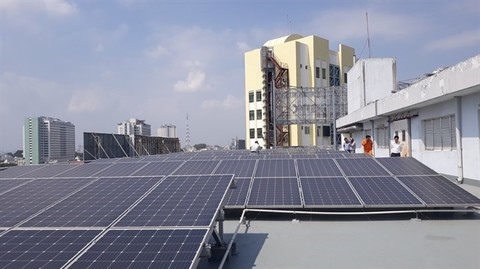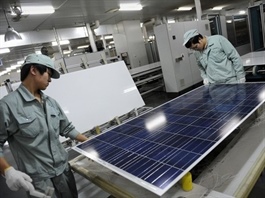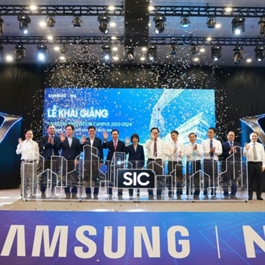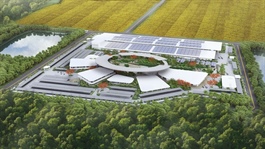Rooftop solar power trading is a no, for now
Rooftop solar power trading is a no, for now
Allowing trading in energy produced by a self-producing and self-consuming system could lead to market shocks, potentially causing an imbalance with the power sources, said Minister of Industry and Trade Nguyễn Hồng Diên, during a workshop on promoting self-generated rooftop solar power which aims to meet self-consumption needs, reduce reliance on the national grid, and ease pressure on the power system.

Solar panel installed on the rooftop of a factory in the southern city of Biên Hòa. — VNA/VNS Photo |
The power can still be connected to the national grid but transmission can only priced at VNĐ0, a requirement that has sparked controversy with opponents saying the policy is counterproductive as a way of encouraging the public and businesses to participate.
On the other hand, the ministry has advised the Government that self-generated rooftop solar systems can be connected to the grid without requiring a permit. In addition, owners of structures equipped with such systems do not need to amend their land uses, as under current regulations.
"Self-generated rooftop solar power is exempt from some legal provisions while enjoying various incentives. Allowing commercial activities means businesses and investors must comply fully with current regulations," said the minister.
He added: "The question we should be asking is what would happen if rooftop solar power were allowed to be traded?"
The minister said there could be rapid and volatile developments and difficulties in managing power sources and ensuring safety. Traditional sources of power such as coal, gas and hydroelectric projects and their investors may also lose some of their current benefits.
However, the VNĐ0 policy is only temporary and a different approach to rooftop solar power's financial utilisation could be taken in the future.
Nguyễn Anh Tuấn, vice-president of the Vietnam Energy Association said the VNĐ0 policy is a precautionary and necessary step to prevent policy exploitations in a new industry. He, however, suggested that there should be a predetermined date to review the policy. Meanwhile, exceptions should be considered for cases in which there are urgent power needs due to rooftop solar power's ability to be deployed quickly.
"Clear definitions are needed to minimise possible misinterpretations," he said.
He proposed the ministry consider remote areas, islands, mountainous regions and areas with difficult electricity transmission to become exceptions and to be granted special status.
"Perhaps, households with storage systems could sell electricity to the grid during peak hours from 4pm to 7pm at a higher price to encourage storage installation and support the system," he said.
Nguyễn Đức Hạnh, deputy director of the Institute of Energy Science said there should be a way to trade the power generated without making actual payments and that incentives for investors in power projects in remote, distant, and island areas would be paramount to the success of the development.
Continued support
Việt Nam has set a target of having 50 per cent of its office and residential buildings equipped with solar panels by 2030, that is in the National Power Plan VIII.
In order to hit that target, the Ministry of Industry and Trade (MoIT) has started writing a proposal to the Government for the policy framework required to support the development of rooftop solar power sources, requesting assistance from the Ministry of Justice on connected legal matters.
In addition, the proposal aims to produce a clear picture of the key players in the rooftop solar power industry, as well as the types of structures that can be equipped with solar panels.
Under the National Power Plan VIII 2021-30, approved by the Prime Minister in May last year, Việt Nam prioritises the development of solar and wind power in residential, industrial structures and offices. The plan also explicitly prohibits the sales of the generated power on the national transmission grid.

























